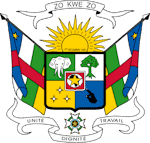-
- Type of Government: Presidential Republic
- Population: Approximately 5 million
- GDP: Around $2.3 billion USD
- Corporate Tax Rate: 30%
- Personal Income Tax Rate: Progressive, up to 50%
- Major Exports: Diamonds, timber, cotton
- Major Imports: Food, machinery, chemicals
Doing Business with Central African Republic
A comprehensive guide to doing business, exporting, investing, and manufacturing in Central African Republic.
Exporting to the Central African Republic involves several steps to ensure compliance with local regulations. Here’s a detailed guide:
-
Conduct Market Research
- Analyze demand for your product in the Central African Republic.
- Identify potential competitors and market entry strategies.
-
Verify Product Compliance
- Ensure your product meets local standards and regulations.
- Contact the Central African Republic’s customs authority for guidance.
-
Understand Tariffs and Taxes
- Check applicable import duties and taxes for your goods.
-
Arrange Logistics and Shipping
- Choose a reliable shipping company familiar with local logistics.
- Ensure all shipping documents are accurately completed.
-
Prepare Documentation
- Include commercial invoices, packing lists, and certificates of origin.
- Verify compliance with local customs requirements.
-
Customs Clearance
- Work with a customs broker to facilitate the clearance process.
- Pay any duties and taxes required for the import.
-
Distribution and Sales
- Establish distribution channels within the Central African Republic.
- Consider partnerships with local businesses for effective market penetration.
Key Contacts
- Ministry of Trade and Industry
- Website: Ministry of Trade
Importing goods into the Central African Republic involves several steps to ensure compliance with local regulations. Here’s a detailed guide:
-
Register Your Business
- Ensure your business is registered in the Central African Republic.
- Obtain necessary licenses and permits.
-
Classify Your Goods
- Use the Harmonized System (HS) codes to classify your goods accurately.
-
Verify Import Regulations
- Familiarize yourself with the country’s import regulations.
- Check if your goods require special permits or certificates.
-
Check Tariffs and Taxes
- Identify applicable import duties and taxes for your goods.
-
Arrange Logistics and Shipping
- Select a reputable shipping company.
- Ensure all shipping documents are accurately completed.
-
Prepare Import Documentation
- Include commercial invoices, packing lists, and certificates of origin.
- Ensure compliance with local customs requirements.
-
Customs Clearance
- Work with a customs broker to facilitate the clearance process.
- Pay any duties and taxes required for the import.
-
Receive and Distribute Goods
- Arrange for the delivery and distribution of goods upon clearance.
- Set up local partnerships if needed.
Key Contacts
- Ministry of Trade and Industry
- Website: Ministry of Trade
Incorporating a company in the Central African Republic involves several key steps. Here’s a detailed guide:
-
Choose a Business Structure
- Decide on the type of company, such as a limited liability company or corporation.
-
Select a Business Name
- Ensure your company name is unique and complies with naming regulations.
- Check availability with the relevant registry.
-
Prepare Incorporation Documents
- Draft the Articles of Incorporation.
- Include details of directors, shareholders, and company address.
-
Register the Business
- Submit incorporation documents to the Agence Centrafricaine pour la Crà©ation d’Entreprises (ACCE).
- Pay the required registration fees.
-
Obtain a Tax Identification Number
- Register for tax purposes with the Direction Gà©nà©rale des Impà´ts.
-
Register for Social Security
- Enroll employees in the social security system.
-
Obtain Necessary Licenses and Permits
- Determine if specific licenses or permits are required based on your industry.
Costs
- Incorporation Fees: Vary depending on business structure and specifics.
- Additional Fees: May include notary fees and publication costs.
Key Contacts
- Agence Centrafricaine pour la Crà©ation d’Entreprises (ACCE)
- Direction Gà©nà©rale des Impà´ts
- Contact through local offices for tax registration details.
Setting up a manufacturing plant in the Central African Republic involves several steps. Here’s a detailed guide:
-
Conduct Market Research
- Analyze local demand and industry trends.
- Evaluate potential competitors and supply chain logistics.
-
Choose a Suitable Location
- Identify industrial zones with necessary infrastructure.
- Contact local municipalities for available sites and incentives.
-
Register Your Business
- Incorporate your company through the Agence Centrafricaine pour la Crà©ation d’Entreprises (ACCE).
-
Obtain Necessary Permits
- Apply for construction, environmental, and zoning permits.
- Contact local government offices for specific requirements.
-
Secure Financing
- Explore funding options through banks or investment agencies.
- Consider government incentives for manufacturing.
-
Design and Construct the Facility
- Hire architects and contractors familiar with local regulations.
- Ensure compliance with building codes and safety standards.
-
Install Equipment and Machinery
- Import necessary machinery, ensuring compliance with local regulations.
- Coordinate with customs for smooth importation.
-
Recruit and Train Staff
- Hire local talent and provide necessary training.
- Contact local employment services for assistance.
-
Register for Taxation
- Ensure your business is registered for applicable taxes with the Direction Gà©nà©rale des Impà´ts.
-
Begin Operations
- Ensure all systems are in place and test the production line.
- Implement quality control measures.
Key Contacts
- Agence Centrafricaine pour la Crà©ation d’Entreprises (ACCE)
- Direction Gà©nà©rale des Impà´ts
- Contact through local offices for tax registration details.
Registering a trademark in the Central African Republic involves several steps to ensure legal protection. Here’s a detailed guide:
-
Conduct a Trademark Search
- Check if your trademark is available by searching the national trademark database.
-
Prepare Your Application
- Gather necessary information: trademark representation, goods/services classification, and applicant details.
-
Submit Your Application
- File the application with the Organisation Africaine de la Proprià©tà© Intellectuelle (OAPI), which handles IP rights for member states.
-
Pay the Application Fee
- Fees vary; contact OAPI for current rates and payment details.
-
Examination Process
- OAPI reviews the application for compliance and potential conflicts.
- Respond to any objections or requests for additional information.
-
Publication and Opposition
- If approved, the trademark is published for opposition.
- There is a period for third parties to oppose the registration.
-
Registration and Certification
- If no oppositions arise, the trademark is registered.
- Receive a certificate of registration.
-
Maintain and Renew the Trademark
- Trademarks are valid for ten years and can be renewed indefinitely.
- Submit renewal applications before expiry to maintain protection.
Costs
- Application Fee: Varies; contact OAPI for details.
- Renewal Fee: Contact OAPI for current rates.
Key Contacts
- Organisation Africaine de la Proprià©tà© Intellectuelle (OAPI)
- Website: oapi.int
Resolving commercial disputes in the Central African Republic involves several steps and options. Here’s a guide on the process:
-
Attempt Negotiation
- Start by negotiating directly with the other party to find an amicable solution.
-
Mediation
- Engage a neutral third-party mediator to facilitate discussions.
- Mediation can be quicker and less formal than court proceedings.
-
Arbitration
- Consider arbitration as an alternative to court litigation.
- The Cour Commune de Justice et d’Arbitrage (CCJA) can provide arbitration services.
-
Seek Legal Advice
- Consult with a lawyer specializing in commercial law for guidance on your case.
-
File a Lawsuit
- If other methods fail, file a lawsuit in the appropriate local court.
- Court fees vary; consult the specific court for details.
-
Court Proceedings
- Prepare for the legal process, which includes hearings and presenting evidence.
-
Judgment and Enforcement
- If a judgment is made, ensure its enforcement through legal channels.
Costs
- Mediation and Arbitration Fees: Vary depending on the service provider.
- Court Filing Fees: Dependent on the jurisdiction and case type; consult local courts.
- Legal Fees: Vary based on the lawyer and complexity of the case.
Key Contacts
- Cour Commune de Justice et d’Arbitrage (CCJA)
- Website: oapi.int
When considering doing business in the Central African Republic, it’s important to understand various factors that can influence operations. Here’s an overview of social, cultural, political, and economic aspects:
Social and Cultural Factors
- Language and Communication
- The official language is French, with Sango also widely spoken.
- Business communication tends to be formal.
- Business Etiquette
- Building personal relationships and trust is crucial.
- Punctuality and respect are valued in business interactions.
Political Environment
- Government Structure
- The Central African Republic is a presidential republic.
- Political stability can vary, affecting business operations.
- Regulatory Environment
- Regulations may be less predictable; staying informed is important.
- Corruption can be a challenge in some sectors.
Economic and Foreign Exchange Factors
- Currency
- The currency is the Central African CFA franc (XAF), pegged to the euro.
- Exchange rates are stable due to the euro peg.
- Investment Climate
- Opportunities exist in natural resources and agriculture.
- Infrastructure challenges may impact business operations.
Rule of Law
- Legal System
- Based on French civil law.
- Enforcement of contracts and property rights can be inconsistent.
- Property Rights
- While legally protected, practical enforcement may vary.
Infrastructure
- Transportation and Logistics
- Infrastructure is underdeveloped, affecting logistics and supply chains.
- Telecommunications are improving but can be unreliable.
Relevant URLs
- Ministry of Trade and Industry: Ministry of Trade
- Organisation Africaine de la Proprià©tà© Intellectuelle (OAPI): oapi.int
Our Members Include Leading Organizations in Central African Republic
Ask our Experts on Doing Business in/with Central African Republic
If you’re looking to do business or invest in Central African Republic, we can provide expert guidance, market insights, and valuable connections to help you navigate the local landscape. Contact us today to discover how we can assist in making your venture a success.



